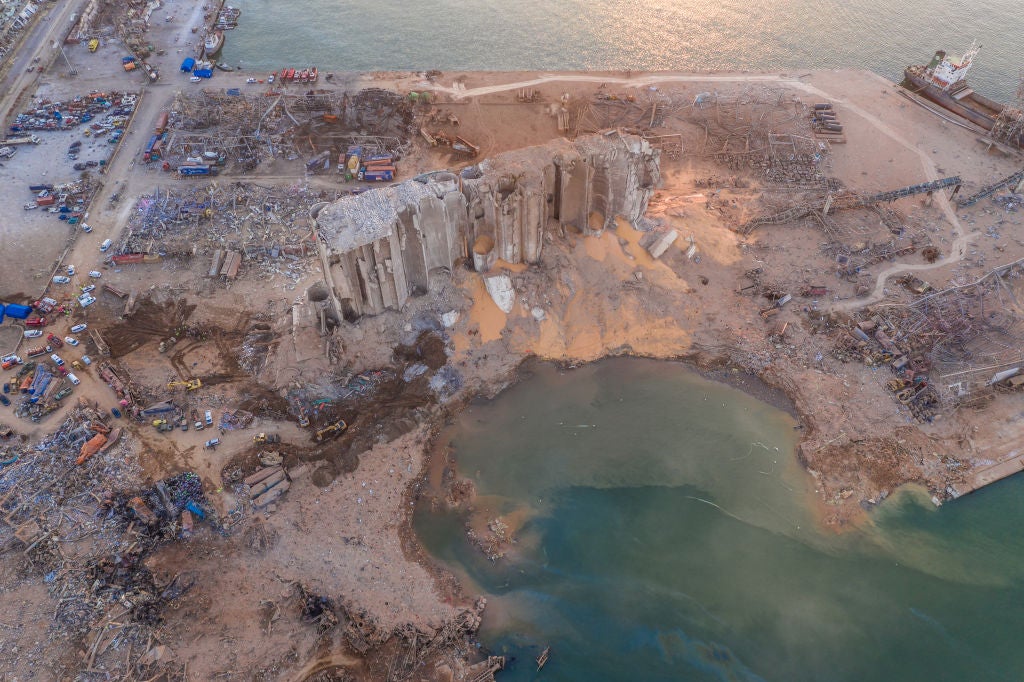In the departments of Beirut’s destroyed Karantina hospital, the staff are busy working in what looks like a forlorn bombsite along a now-abandoned front line of a former warzone.
The medical centre is located under a kilometre from the warehouse of explosive materials which blew up the Lebanese capital in August, killing more than 200 people and injuring thousands more. And so, the government building and the neighbourhood surrounding it appears to have been chewed up and clawed out by rioting giants.
One of the nurses lives in a nearby area which was also destroyed, so she is staying with relatives since she cannot afford to fix her home. Her salary is now worth just £75 a month because of Lebanon’s financial collapse, which has seen the value of the local currency tumble by more than 80 per cent.
“What can I do?” she says with that desperate look – now so familiar in Lebanon – that knows there is no good answer to that question.
“We get no help and no answers and no justice.”
The only tentative ray of light, she says, was the surprising news last week that the Lebanese judge investigating the explosion took the unparalleled step of charging the caretaker prime minister, Hassan Diab, and three former ministers Ali Hassan Khalil, Ghazi Zeaiter and Youssef Finianos, with negligence over the blast. All four are close allies of Lebanese militant and political group Hezbollah, and other powerful parliamentary factions.
Diab’s office said the current prime minister was surprised at the charges, he was “confident that his hands are clean”, and that the handling of the blast was done in a “responsible and transparent manner”.
The blast, which is one of the largest non-nuclear explosions in modern history, is thought to have been caused by several thousand tonnes of poorly stored ammonium nitrate catching fire. The Independent’s own investigations showed that since 2014, when the explosive materials were first deposited in Beirut port, successive customs and port officials, as well as security departments, governments and even the president, were warned of the dangers of the stockpile but did nothing to dispose of it.
Up until recently, however, only low- to mid-level officials had been questioned and arrested, and many thought that the country’s most senior figures would, as usual, be left untouched.
In Lebanon one of the resounding cries of the protesters during the recent uprising was against this seemingly impenetrable armour of immunity that the ruling elite enjoy, despite allegations many are involved in rampant mismanagement and corruption that caused the financial collapse of the country and in some ways the blast.
And so, the move by Judge Fadi Sawan to indict the four figures not only shocked the nation but ignited rage among Lebanese political factions who may well be perturbed that this might lead to accountability on a high level.
Hezbollah said the charges smacked of “political targeting” of a particular group of people over another.
Former prime minister and now prime minister-designate Saad al-Hariri visited Diab on Friday, when he accused Sawan of breaching the constitution and pledged not to let anyone violate “the post of prime minister”.
Zeaiter, a deputy from the same bloc as powerful parliamentary speaker Nabih Berri, called the charges against him “a blatant violation” that he would not remain silent about.
In fact the political leadership have presented a united front, arguing that the move contradicted Lebanon’s constitution, which specifies that there must be a separate council made up of judges and politicians set up by parliament that can try ministers and premiers for crimes of high treason, dereliction of duties, and breach of the constitution.
But it seems efforts by Sawan to get the parliament to set up this body and investigate were rejected. The judge appears to have exercised his jurisdiction to bypass the legislature and push ahead with the negligence charges.
While there is apparently paperwork showing that that Diab, and the other three ministers that were charged, allegedly knew about the explosive stockpile, there is also evidence pointing to several other senior figures, according to Riad Kobaissi an investigative journalist following corruption in the port.
This might mean more high-profile indictments in the future, a first for Lebanon and potentially setting a precedent for further difficult cases in the future.
And so, the backlash from the parliamentary parties and groups was “the mafia defending themselves because a judge dared to challenge them”, he said.
“For the first time ministers can be indicted, they are not untouchable. It’s gangs defending themselves,” he told me.
That has brought some hope that someone senior might finally be held to account for the myriad of disasters Lebanon is limping through.
But even that won’t undo the damage done to the hardest hit. People like the medical staff still working hard at Karantina hospital despite the risks of the coronavirus and the fact many are earning the equivalent of less than £3.50 a day.
“We are stuck in a nightmare,” says another medic, whose home was also damaged in the explosion.
“We pray for a miracle or the opportunity to leave.”






Join our commenting forum
Join thought-provoking conversations, follow other Independent readers and see their replies
Comments